|
Гипермаркет знаний>>Английский язык>>Английский язык 9 класс>> Streets and avenues. Grammar Cardinal and ordinal numerals

 Количественные и порядковые числительные (Cardinal and ordinal numerals) Количественные и порядковые числительные (Cardinal and ordinal numerals)
1 Copy the table into your exercise books and fill in the gaps in the table with ordinal numerals.
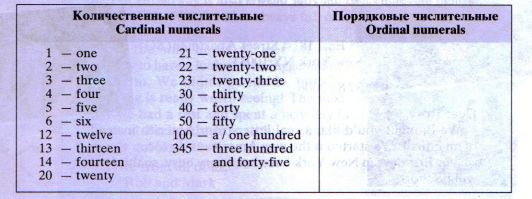
Writing and reading dates
In BrE they write "2 July / 2nd July / July 2". They say the "second of July" or "July the second".
In AmE they write "July 2nd / July 2". They say "July second".
Dates are sometimes written as numbers, for example, 3/10. In BrE this means the third of October. In AmE it means the tenth of March.
2 Play a game. Write down some dates in numbers. Then read them to your partner in any order you choose. Your partner should match the dates with the descriptions from the game.
Model: A: the 21st of October
B: Is that your birthday?
A: Yes, it is.
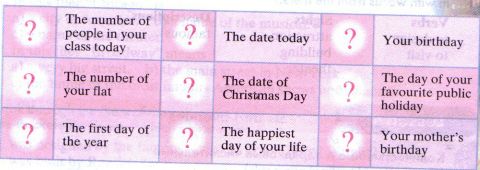
3 Rob and Mark are writing a letter to their sister Rosy. Read the text for detail and be ready to work with the map. Try to guess what the letters NY in the address stand for. On what date are the friends writing the letter? Explain your answers.
25 East 181st Street Apartment 8G
New York NY 10033
5 / 8/2006
Dear Rosy,
We thought you'd like a real letter from America instead of an e-mail. We started it the way Americans do too.
Our first days in New York have been very busy, so this letter will be short.
May this year is very warm so on our first day we walked a lot. was our guide, but it's difficult to get lost in New York. It a very clever system of streets and avenues. Streets run east to west across the island and are often called cross-streets, while avenues run north to south down the island.
First, we took the subway to the city centre. Most of the subway have the same names as the streets. We got off at Penn Station and walked to the Empire State Building.
There was a long queue to get to the top and after that we also wasted some time on an expensive attraction called Skyride (on the 2nd floor of the Empire State Building). The advert made the ride look like fun, but the ride itself was just a short film about New York. When we finally left the Empire State Building, we didn't have much time. We had a quick look at Rockefeller Center and some other famous skyscrapers and took the subway to Whitehall Street. From there we caught the ferry to Staten Island to see the Statue of Liberty.
In the evening we went to Broadway and saw one of the most famous musicals, Chicago. Did you know that Broadway isn't just one of the longest avenues in Manhattan? It is also famous for the small area near Times Square where Broadway crosses Seventh Avenue. This is the home of many Broadway theatres. This part of Broadway is also known as "the Great White Way" and is always full of tourists.
On the way home we got off the subway to have a look at the Guggenheim Museum. We didn't go inside, but the building is really worth seeing! The next day we had a rest and spent a lazy day in Central Park, which is so huge that we nearly got lost.
Love from all of us,
Rob and Mark
4 Say if the following information is true, false or not mentioned. If there is no information, try to guess. Explain your answers.
1. Mark and Rob are very excited about their first days in New Y
2. It's easy to find your way in New York.
3. Avenues run north to south.
4. Streets run parallel to the Hudson River.
5. All New York streets have numbers instead of names.
6. It doesn't take long to visit the Empire State Building.
7. Mark and Rob have been inside the Empire State Building.
8. Mark and Rob have been inside Rockefeller Center.
9. Mark and Rob have not been inside the Guggenheim Museum.
10. Broadway is famous because it's the longest avenue in New York
11. There are streets called Broadway in many American cities.
12. Central Park.isn't very big.

Streets and avenues— To find a place, it is very important to know the nearest cross-street and avenue to the address. This will help you decide which bus or subway line to use, and it gives you an idea of how far away a restaurant or a shop is. For example, if you tell a New Yorker that you need to get to somewhere on 48th Street between — 11th and 12th Avenue, he or she will be able to tell you the way easily.
East and west street addresses — Fifth Avenue divides Manhattan Street addresses into east and west. Avenues between the Hudson River and Fifth Avenue are west of Fifth Avenue; other avenues are east of Fifth Avenue. That means that every street has two sides: east and west, and you can often find two buildings with the same number in the same street. For example: 1 West 8th Street and 1 East 8th Street.
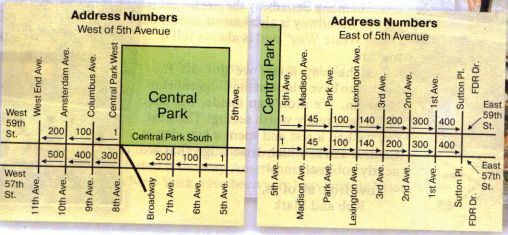
Street addresses increase by 100 for each numbered avenue as you move away from Fifth Avenue.
It's very easy to go west of Fifth Avenue towards the Hudson River. Street addresses from 1 to 99 are between Fifth Avenue and Sixth Avenue, and 100 to 200, between 6th and 7th Avenue, etc. If you want to go east, it's a bit more difficult because some avenues have names as well as numbers: Madison, Park, and Lexington. Street addresses 1 to 44 are between Fifth Avenue and Madison Avenue, 45 to 99 — between Madison Avenue and Park Avenue.
5 Try to answer these questions. Use the information America in focus.
Model: Where is 145 West 10th Street? -
It's between 6th and 7th Avenue.
1. Where is 49 West 44th Street?
2. Where is 49 East 44th Street?
3. Where is 435 East 16th Street?
4. Is there an address 700 West 42nd Street in Manhattan? Why? / Why not?
5. Is there an address 1000 East 39th Street in Manhattan? Why? / Why not?
6. Does Emily live far from the center of Manhattan if her address is 25 East 181 Street?
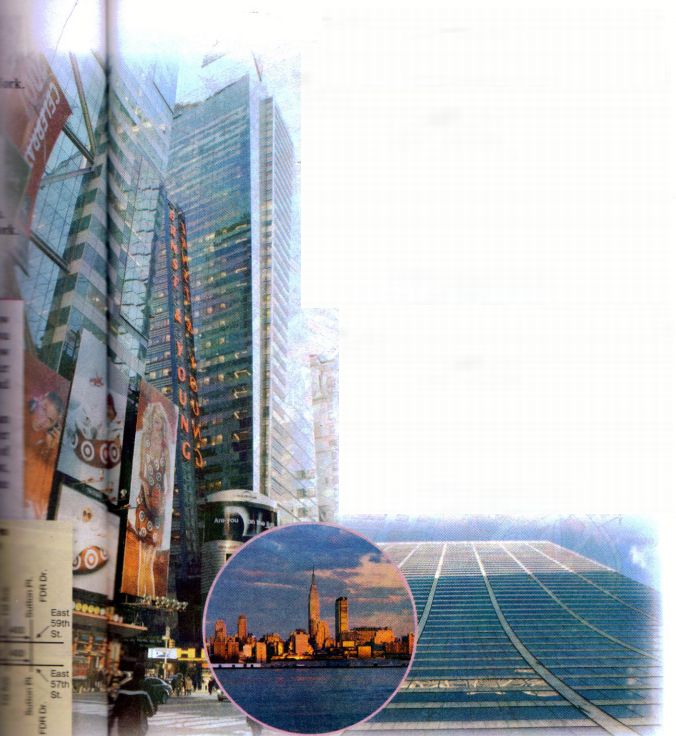
6 Look ot the map and draw the route that Emily and her friends took. Use the information from Ex. 3.
1. The Empire State Building
2. The Rockefeller Center
3. The Guggenheim Museum
4. Central Park
5. The Statue of Liberty
6. Central Station
7. The Chrysler Building
8. The American Museum of Natural History
9. The UN Headquarters
10. The World Trade Center
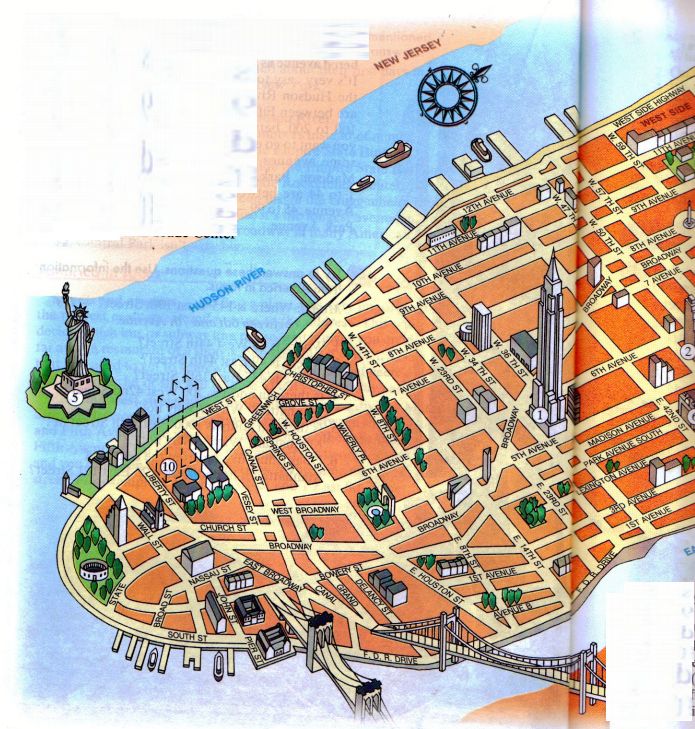
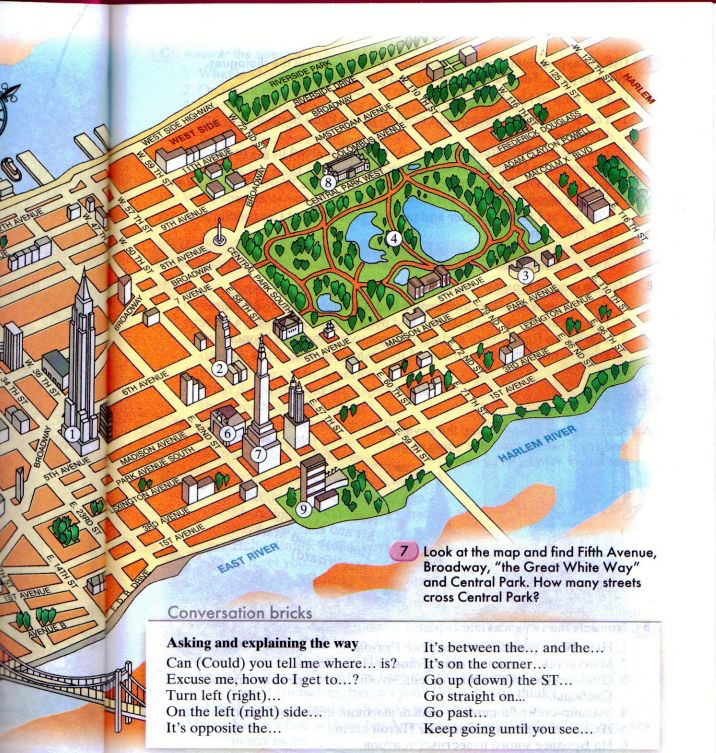
8 Use the expressions from Conversation bricks to act out the dialogues. Work in pairs. Take turns to ask for and give directions.
A. Use the map of New York.
1. You are in Times Square and need to get to Penn Station. Ask for directions.
2. You are on 59th Street and First Avenue. You need to get to the Guggenheim Museum. Ask for directions.
3. You are in Whitehall Street and need to get to the World Trade Center. Ask for directions.
4. You are at Lincoln Center and need to get to Grand Central Station. Ask for directions.
5. You are at the Empire State Building and want to get to Central Park. Ask for directions.
B. Use the map of Moscow.
1. You are near the Bolshoi Theatre and need to get to Red Square.
2. You are at China Town station and need to get to Tverskaya Street.
3. You are in Red Square and need to get to the Pushkin Monument.
4. You are near the Russian State Library and need to get to Arbat.
Homework
А Rosy has sent a reply. Read the envelope and say if her brothers are going to her letter? Why? / Why not?
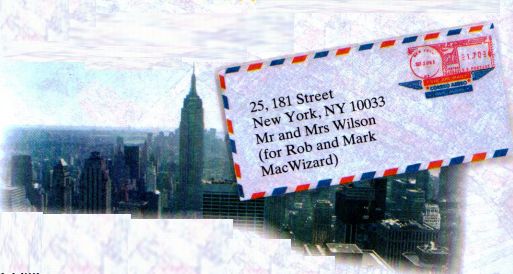
B Translate the sentences into English.
1. Нью-Йорк расположен на реке Гудзон.
2. Манхэттен — один из пяти районов Нью-Йорка.
3. Они поехали на Статен-Айленд, чтобы посмотреть на статую Свободы.
4. Эмпайр-стейт-билдинг — самый высокий небоскреб Нью-Йорка.
5. Их дом находится к западу от Пятой авеню.
6. На Бродвее много известных театров.
С Answer the questions about Moscow.
1. What is Moscow famous for?
2. On which river does Moscow stand?
3. Why is Moscow the seat of the Russian government?
4. What other important institutions are there in Moscow?
5. What is the central square called?
6. What can a visitor see there?
7. What is the most famous theatre called?
D Write some information about your home city / town / village.
К. И. Кауфман, М. Ю. Кауфман Английский язык: Счастливый английский.ру / Happy English.ru: Учебник англ. яз. для 9 кл. общеобраз. учрежд.— Обнинск: Титул, 2008.— 288 с: ил.
Помощь школьнику онлайн, Английский язык для 9 класса скачать, календарно-тематическое планирование
Содержание урока
 конспект урока конспект урока
 опорный каркас опорный каркас
 презентация урока презентация урока
 акселеративные методы акселеративные методы
 интерактивные технологии
Практика интерактивные технологии
Практика
 задачи и упражнения задачи и упражнения
 самопроверка самопроверка
 практикумы, тренинги, кейсы, квесты практикумы, тренинги, кейсы, квесты
 домашние задания домашние задания
 дискуссионные вопросы дискуссионные вопросы
 риторические вопросы от учеников
Иллюстрации риторические вопросы от учеников
Иллюстрации
 аудио-, видеоклипы и мультимедиа аудио-, видеоклипы и мультимедиа
 фотографии, картинки фотографии, картинки
 графики, таблицы, схемы графики, таблицы, схемы
 юмор, анекдоты, приколы, комиксы юмор, анекдоты, приколы, комиксы
 притчи, поговорки, кроссворды, цитаты
Дополнения притчи, поговорки, кроссворды, цитаты
Дополнения
 рефераты рефераты
 статьи статьи
 фишки для любознательных фишки для любознательных
 шпаргалки шпаргалки
 учебники основные и дополнительные учебники основные и дополнительные
 словарь терминов словарь терминов
 прочие
Совершенствование учебников и уроков прочие
Совершенствование учебников и уроков
 исправление ошибок в учебнике исправление ошибок в учебнике
 обновление фрагмента в учебнике обновление фрагмента в учебнике
 элементы новаторства на уроке элементы новаторства на уроке
 замена устаревших знаний новыми
Только для учителей замена устаревших знаний новыми
Только для учителей
 идеальные уроки идеальные уроки
 календарный план на год календарный план на год
 методические рекомендации методические рекомендации
 программы программы
 обсуждения
Интегрированные уроки обсуждения
Интегрированные уроки
Если у вас есть исправления или предложения к данному уроку, напишите нам.
Если вы хотите увидеть другие корректировки и пожелания к урокам, смотрите здесь - Образовательный форум.
|

















